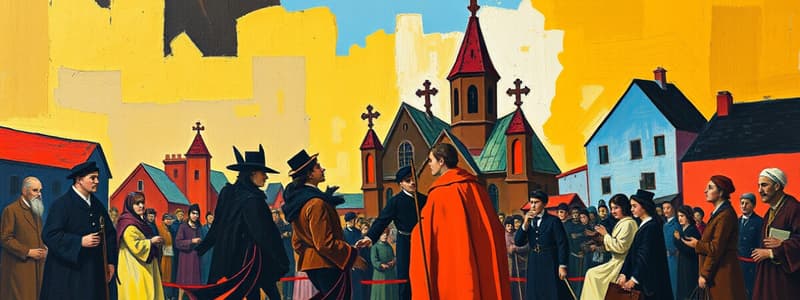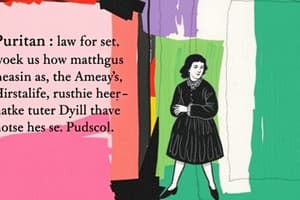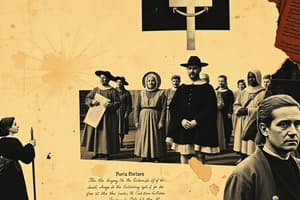Podcast
Questions and Answers
What was the primary governing structure within Puritan communities?
What was the primary governing structure within Puritan communities?
- Democratic governance with elected representatives
- Anarchy where community members governed themselves
- Theocratic structure with intertwined church and state authority (correct)
- Monarchical control under a royal figure
What system promoted local autonomy among Puritan congregations?
What system promoted local autonomy among Puritan congregations?
- Congregationalism allowing self-governing congregations (correct)
- Federalism with a central authority
- Covenant System emphasizing collective responsibility
- Meritocracy rewarding individual contributions
Which method was commonly used to enforce moral conduct in Puritan communities?
Which method was commonly used to enforce moral conduct in Puritan communities?
- Community service as a form of atonement
- Private counseling sessions
- Public punishments for transgressions (correct)
- Monetary fines for misconduct
What was a significant consequence of excommunication in Puritan society?
What was a significant consequence of excommunication in Puritan society?
How did Puritan communities ensure adherence to their moral standards?
How did Puritan communities ensure adherence to their moral standards?
Flashcards are hidden until you start studying
Study Notes
Role of Church in Puritan Communities
Community Governance
- Theocratic Structure: The church played a central role in governance, with leaders often holding both spiritual and political authority.
- Congregationalism: Each congregation was self-governing, making decisions through a council of elders and deacons; this promoted local autonomy.
- Covenant System: Communities operated under a social covenant, binding members to uphold religious and communal laws, emphasizing collective moral responsibility.
- Elders and Ministers: Elders provided spiritual guidance and were often involved in civil matters; ministers had significant influence over community decisions.
- Town Meetings: Regular town meetings facilitated discussion of both secular and religious issues, with church leaders often guiding debates.
Social Control
- Moral Conduct: The church enforced strict codes of moral behavior, with an emphasis on piety, purity, and community welfare.
- Public Punishments: Offenses against religious laws (e.g., adultery, Sabbath-breaking) were met with public punishments to maintain social order and deter sin.
- Excommunication: Excommunicating a member was a severe form of social control, effectively ostracizing the individual and reinforcing community norms.
- Surveillance: Community members were expected to monitor each other's behavior, fostering a culture of accountability and conformity to church teachings.
- Moral Education: Church sermons and teachings served as tools for moral education, guiding members toward a virtuous life aligned with Puritan values.
Community Governance
- Theocratic Structure: Centralized governance where church leaders wielded both spiritual and political authority, integrating faith into civic life.
- Congregationalism: Each congregation operated independently, making decisions through councils comprised of elders and deacons, fostering local self-governance.
- Covenant System: Communities functioned through a social covenant, which required members to adhere to shared religious and communal laws, promoting collective moral responsibility.
- Elders and Ministers: Elders offered spiritual guidance and participated in civic matters; ministers greatly influenced community affairs and decisions.
- Town Meetings: Regular gatherings encouraged discourse on religious and secular issues, with church leaders guiding discussions, reinforcing the church's influence on community governance.
Social Control
- Moral Conduct: The church established strict moral codes emphasizing piety, purity, and the welfare of the community to shape members' behavior.
- Public Punishments: Violations of religious laws, such as adultery or Sabbath-breaking, resulted in public punishments designed to maintain social order and deter sinful behavior.
- Excommunication: This serious form of social control isolated individuals from the community, serving as a strong deterrent against deviation from community norms.
- Surveillance: Members were encouraged to vigilantly monitor each other's behavior, creating a culture of accountability and adherence to church teachings.
- Moral Education: Church sermons and teachings acted as moral guidance, directing congregants towards living a life in line with Puritan values.
Studying That Suits You
Use AI to generate personalized quizzes and flashcards to suit your learning preferences.




